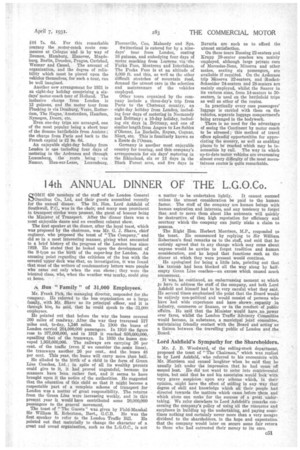14th ANNUAL DINNER OF THE L.G.O.Co.
Page 89

If you've noticed an error in this article please click here to report it so we can fix it.
SOME 450 members of the staff of the London General • Omnibus Co., Ltd, and their guests assembled recently for the annual dinner. The Rt. Hon. Lord Ashfleld of Southwell, P.C., was in the chair; and many men prominent in transport circles were present the guest of honour being the Minister_ of Transport After the dinner there was a most enjoyable dance and an excellent cabaret show.
The first speaker at the dinner, after the loyal toast, which was proposed by the chairman, was Mr. G. J. Shave, chief engineer, who proposed the toast of "The Company," and did so in a most interesting manner, giving what amounted to a brief history of the progress of the London bus since 3919. He stated that be looked upon the development of the S-type as the birth of the super-bus for London. An amusing point regarding the criticism of the bus with the covered upper deck was that, on investigation, it was found that most of the writers of condemnatory letters were people who came out only when the sun shone; they were the leisured class, who, when the weather was murky, cciuld snip. at home.
it Bus "Family," of 31,000 Employees'.
Mr. Frank Pick, the managing director, responded for the company. He referred to the bus organization as a large family, with Mr. Shave as its principal officer, and it is thrOugk him, he said, that he could speak to the 21,000 employees.
He pointed out that before the War the buses covered 300 miles of roadway. After the war they traversed 577 miles and, to-day, 1,246 miles. In 1900 the buses of London carried 264,000,000 passengers. In 1910 the figure rose to 377,000,000, and in 1919 it reached 936,000,000,equalling that of the tramways. In 1930 the bases Oenveyed 1,958,000,000. The railways are carrying 26 per cent, of the traffic (even if we consider the _main lines), the tramways another 26 per cent., and the buees 48 per cent. This year, the buses will carry more than half.
He alluded to the birth of a child in the form. of Green Line Coaches, Ltd.; in spite of all its wealthy parents could give to it, it had proved ungrateful, because its manners have been rather fast, and it seems to have brought upon it the notice of the authorities. He suggested that the education of this child so that it might become a respectable part of a complete scheme of transport for London was a matter of great responsibility. The returns from the Green Line were increasing weekly, and in this present year it would have contributed some 20,000,000 passengers to the general movement.
The toast of 'The Guests" was given by Field-Marshal Sir William It. Robertson, Bart., G.C.B. He was the first speaker to refer to the London Traffic Bill. He pointed out that materially to change the character of a great and proud organization, such as the L.G.O.C., is not a matter to be undertaken lightly. It cannot succeed unless the utmost consideration be paid to the human factor. The staff of the company are human beings with human aspiration and interests, and any tendency to forget that and to move them about like automata will quickly. be destructive of that high reputation for efficiency and courtesy which 'the company can justly niake a claim to possess.
The Right Hon. Herbert Morrison, M.P., responded to the toast He commenced by replying to Sir Wiliam Robertson's final remarks as to the staff, and said that he entirely agreed that in any change which may come about anyone would be unwise to forget tradition and human consideration, and he hoped that functions such as the dinner at which they were present would continue.
Be apologized for being a little late, pointing out that hie taxicab had been blocked all the way along by baleempty Green Line coaches—an excuse which caused much amusement.....
'was, he continued, an embarrassing moment at which /s; have to address the staff of the company, and both Lord Ashfield and himself had to be very careful what they said. He several times emphasized thepoint that the Board would be entirely non-political and would consist of persons who have had Wide experience and have shown: capacity in industry, commerce or finance, or in the conductof public affairs. He said that the Minister would havesuo,.power over fares, whilst the London Traffic 'Advisory Committee would become, in substance, a municipal joint committee, maintaining friendly contact with the Board and acting as
a liaison between -the travelling public of London and tho Board.' .
Lord Ashfield's Sympathy for, the Shareholders.
Mr. J. B. Woodward, of the rolling-stock department, Proposed the toast of "The Chairman," which was replied to by Lord Ashfeld, who referred to his encounters with Mr. Morrison and caused. laughter when he said that he usually left under the impression that he had come =Off second best He did not want to enter into controversial topics, but said that he and his associates .would look with very grave suspicion upon any scheme which, in their opinion, might have the effect of stifling in an way that degree of, skill and knowledge Which all their people had directed towards the matters which came ,before -them and which alone can make for the success. of a great undertaking: We refer elsewhere to Lord Ashfield's remarks concerning the company's policy of using all the resources and, surpluses in building up the undertaking, and paying sonictimes nothing and certainly never more than a very meagre dividend to the shareholders, in the hope-and expectation that the company would later on secure some fair return to those who had entrusted their money to its care.




























































































































